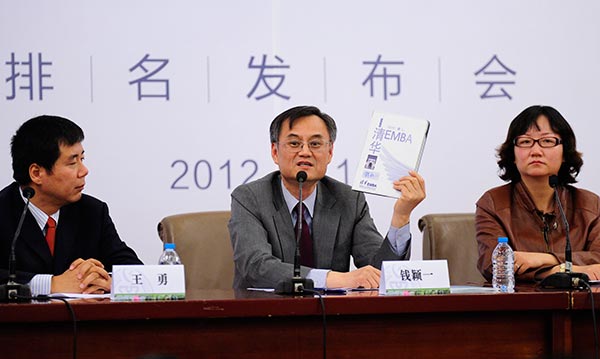
Although the tuition fee for the two-year EMBA program at Shanghai Jiao Tong University has been raised to 588,000 yuan ($90,800) this year from 568,000 yuan in 2015, competition is quite stiff. According to Pu, it is still too early to attribute this to the tightening control.
"I see the regulators have introduced the new policy to restore order to the business education market. But for us, quality always comes first. We have a very careful screening process for students. They should all have a university degree, at least eight years of working experience, among which five years should be in management positions. And, above all, they should have a higher English proficiency. Otherwise, they won't be able to understand the courses," he said.
Ma Luting, a senior researcher at the National Center for Education Development and Research, said the new regulation is probably aimed to introduce order in a particularly chaotic segment of certain courses. "The Ministry of Education is being responsible towards students."
EMBAs were introduced in China in 2002 by institutions such as Fudan University and Peking University. Much efforts went into popularizing the courses. To maintain quality, the number of students was kept between 100 and 400 for each program.
According to the Xinhua News Agency, 64 Chinese universities were authorized by the Ministry of Education to offer EMBA programs.
But the actual number of schools offering such courses is much higher. Some universities and even social institutions have come up with courses in the name of EMBA training workshops.
Long Huanyi, a senior sales manager with Scania (China) Sales Co Ltd, received his EMBA three years ago. He said most of his batchmates think the new policy may result in excessive regulation of EMBA courses.
"The concept of EMBA education comes from the United States. But in the US, we don't see a common EMBA entrance test. Schools can organize their own tests. I think Chinese business schools should (be allowed to) do the same," he said.
"I understand the Ministry of Education has concerns over the quality of EMBA education. In the long run, regulations will help facilitate a more sustained growth. But I don't think a common entrance test will solve all the problems. Like US schools, Chinese schools can evaluate the candidate's written test results as well as his work experience. After all, the education is aimed at people with management background."
Tian Yu, general manager of Shanghai-based wine merchant Euro Shop, wanted to pursue an EMBA in Beijing last year but dropped the plan for want of adequate time. With regulations set to become stricter, she said she would not consider an EMBA in the short term.
"It's true some EMBA programs are overly hyped. Such courses need more regulation. But for most EMBA students, the most important goal is to expand their social network, which might help them advance their career. Under the new regime, it might be more difficult to enroll at a Chinese university in the future, but there are always private institutions such as CEIBS or CKGSB to choose," she said.
This is not the first time that the government has tightened EMBA regulations. In 2014, the central government had banned its officials and executives of State-owned enterprises from pursuing expensive EMBA courses.
Those who had already enrolled and were mid-way through the courses, were asked to drop out immediately. About 8 percent of Chinese EMBA students were government officials and SOE executives.


















































